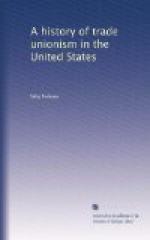So loud, indeed, was the cry that justice had been thwarted that juries were doubtless influenced by it. Two cases came up soon after the tailors’ case, the Hudson, New York, shoemakers’ in June and the Philadelphia plasterers’ in July 1836. In both the juries found a verdict of not guilty. Of all journeymen indicted during this period the Hudson shoemakers had been the most audacious ones in enforcing the closed shop. They not only refused to work for employers who hired non-society men, but fined them as well; yet they were acquitted.
Finally six years later, in 1842, long after the offending trade societies had gone out of existence under the stress of unemployment and depression, came the famous decision in the Massachusetts case of Commonwealth v. Hunt.
This was a shoemakers’ case and arose out of a strike. The decision in the lower court was adverse to the defendants. However, it was reversed by the Supreme Judicial Court of Massachusetts. The decision, written by Chief Justice Shaw, is notable in that it holds trade unions to be legal organizations. In the earlier cases it was never in so many words held that trade unions were unlawful, but in all of them there were suggestions to this effect. Now it was recognized that trade unions are per se lawful organizations and, though men may band themselves together to effect a criminal object under the disguise of a trade union, such a purpose is not to be assumed without positive evidence. On the contrary, the court said that “when an association is formed for purposes actually innocent, and afterwards its powers are abused by those who have the control and management of it to purposes of oppression and injustice, it will be criminal in those who misuse it, or give consent thereto, but not in other members of the association.” This doctrine that workingmen may lawfully organize trade unions has since Commonwealth v. Hunt been adopted in nearly every case.
The other doctrine which Justice Shaw advanced in this case has been less generally accepted. It was that the members of a union may procure the discharge of non-members through strikes for this purpose against their employers. This is the essence of the question of the closed shop; and Commonwealth v. Hunt goes the full length of regarding strikes for the closed shop as legal. Justice Shaw said that there is nothing unlawful about such strikes, if they are conducted in a peaceable manner. This was much in advance of the position which is taken by many courts upon this question even at the present day.




